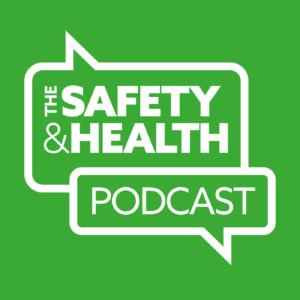In episode 8 of the Safety & Health Podcast, we hear from Gill Kernick about the pressing need to improve building safety culture post-Grenfell. We then look ahead to 2021 with some news from the Women in Safety & Health Network, plus hear an update on the One Percent Safer Foundation.
 Gill Kernick is Transformation Director at Arup University, formerly Master Consultant at JMJ Associates, a specialist specialises in safety leadership and culture. As a former Grenfell resident, moving out three years before the tragedy in 2017, she has been a high-profile voice on the subject. In this episode, she chats to SHP Editor Ian Hart and IFSEC Global Editor James Moore about the pressing need to improve building safety culture and prevent low probability, high consequence events – such as Grenfell – from happening again.
Gill Kernick is Transformation Director at Arup University, formerly Master Consultant at JMJ Associates, a specialist specialises in safety leadership and culture. As a former Grenfell resident, moving out three years before the tragedy in 2017, she has been a high-profile voice on the subject. In this episode, she chats to SHP Editor Ian Hart and IFSEC Global Editor James Moore about the pressing need to improve building safety culture and prevent low probability, high consequence events – such as Grenfell – from happening again.
Click here to listen to the episode in full
Gill now lives close to Grenfell and can see the tower from her new home. She said: “Having watched the fire, I became committed to applying the learnings of major accident prevention to Grenfell and the wider housing sector. I had assumed, falsely, that Grenfell would be a catalyst for change. Over time, I’ve sadly realised this hasn’t happened hence the need for so many of us to campaign.”
“It was predictable, absolutely preventable, and we’re not learning the lessons. We’re not changing how we think about our relationship to risk in the case of buildings.”
In the interview Gill speaks about her role as a safety consultant and how the role of the safety practitioner has changed. She then speaks candidly about Grenfell, the Grenfell Inquiry, building safety and third-party approvals in the fire safety sector.
She also highlights her frustrations with the lack of systemic change in the building safety sector, adding: “While piecemeal change will improve certain safety processes, the culture within building safety needs to change for lessons to be learned. The lack of political intent for systemic change, coupled with a lack of consequences for those involved in building unsafe buildings, will mean poor practice will continue. Sadly, the people currently bearing the consequences of all this appear to be the leaseholders, residents and taxpayers.
James goes into more detail on this, in his article on IFSEC Global.
Gill’s work saw her voted amongst the top 25 Most Influential People in Health & Safety by SHP’s readers, back in December.
Women in Health and Safety
In part two, we’re joined by Heather Beach, Chair of the Women in Health and Safety Network in the UK, to discuss how the pandemic has affected the network, its plans for 2021 and how you can get involved. Plus, learn about the new International Women in Safety Coalition.
One Percent Safer
Finally, Andrew Sharman, Founder and Chairman of One Percent Safer and Malcolm Staves, Corporate Health & Safety Director at L’Oréal, join us to provide an update on the One Percent Safer book, the Foundation and the up-coming conference.
Safety & Health Podcast
Subscribe and tune in the Safety & Health Podcast to discover the latest issues facing the health and safety profession, and stay on-top of the developments affecting your role, from working at height, lone working and common workplace hazards, to safety culture, behaviours, occupational health and mental health and wellbeing.
Last time out, we revisited two recent SHP webinars and find out whether there is a difference between leadership and safety leadership and how to implement a successful safety culture within an organisation.





Not so sure problem is so hard to solve , it’s about money. Cheap complicated buildings with no one being responsible for changes and cost cutting. Planning laws are a lot older than we’re lead to believe. As for stay put policy, panic, fear, trust, human nature all ignored. Expert opinion means sod all, if people loose trust. Modern buildings are killers, it’s just when. Planners, designers cannot accept their accountability, Surely those that dismissed tenants pleas should have been named, blamed and asked to explain “ publicly “. Spent my whole life in the building trade , never meet… Read more »